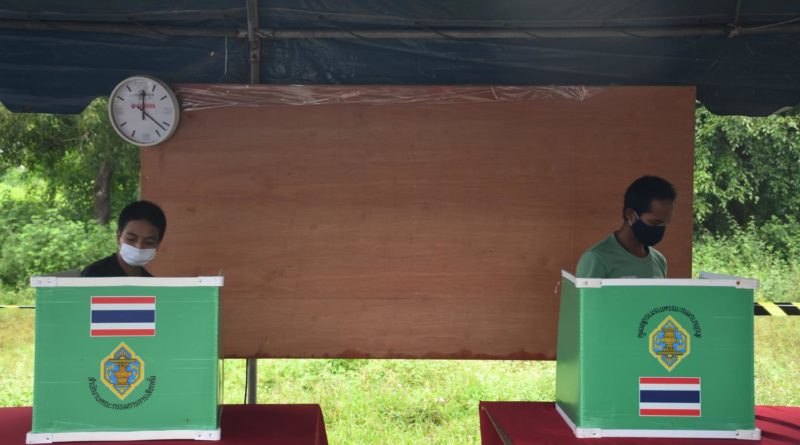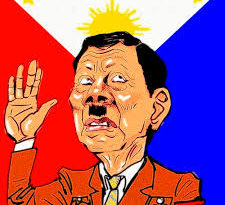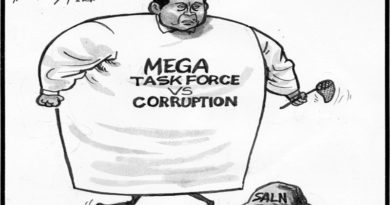COLUMN-OPINION: BANGKOK- PAO polls: An illusion of democracy?
Voters cast their ballots in the Provincial Administration Organisation election in Songkhla on Sunday. (Photo by Nutthawat Wicheanbut)
.
PAO polls: An illusion of democracy?
.
PEERASIT KAMNUANSILPA
FOUNDER AND FORMER DEAN
OF THE COLLEGE OF LOCAL AD

Last Sunday, Thailand had a long-overdue election of the chairs and council members of all Provincial Administration Organisations (PAO). Are these elections really meaningful?
Following the 2014 coup, the National Council for Peace and Order (NCPO), under then-army chief Gen Prayut Chan-o-cha upended a foundation of Thai democracy by issuing an order to suspend local elections. The politically powerful junta then began to co-opt all locally elected politicians and local government officials to become centrally appointed representatives of the central government.

This process began with NCPO’s Order Number 1/2557, in which one prescribed role of the locally elected leaders was to become partners of the military junta in restoring peace and order to the country. This made them complicit in undermining local governments in exchange for being able to legitimately keep their positions for an unspecified period of time without having to undergo the process of competing with other local candidates to secure the consent of the local citizens to allow them to serve. In other words, if they played ball with the junta, they would not need to face elections.

This process of co-optation was then delegated to the Interior Ministry. This change obligated the leaders and the executives of all local governments to be accountable to the central government, thus becoming de facto representatives of the central government. Consequently, local leaders then had an allegiance to the powers in the central government.
Today, the political landscape is in stark contrast to the setting when the 1997 Constitution was in effect. During that period, it looked like the country was moving in the right direction. The civilian governments were supportive of local administrations and navigated the country towards decentralised management. However, because of the lack of necessary political will on the part of the national leaders, we are now returning to square one.
.

Political will is measured by the three S’s: Statements, Structure and Selection of Personnel. First, there were no strong supportive Statements about decentralisation from the prime minister. Only leaders at the ministerial level spoke sporadically about the importance and benefits of granting autonomy to — and making partnerships with — local governments in national development.
In terms of Structure, in 1999, the Prime Minister’s Office created the Office of the National Decentralisation Committee. It was chaired by leaders at the ministerial level, which had no legal authority for bureaucratic, structural transformation. The committee is composed of, and dominated by, the heads of central government agencies. They are precisely the ones who will lose control of the budget and other resources if decentralisation does happen. In effect, the central government is — and has been — committed to failure from the beginning, by creating weak local government organisations.

The third S, Selection of Personnel, is both a cause and effect of the Structure. There is no strong and effective government official to lead the decentralisation process and act as the champion of local autonomy.
The co-opting of local governments to become agents of the central government and the lack of political will to commit to decentralised management makes one question the real function of local governments in Thailand. A central question is, why has the Office of the Election Commission of Thailand organised a nationwide election just for the PAOs and not for other local government organisations?
To provide context for understanding the functional value of local governments, a group of graduate students of the College of Local Administration at Khon Kaen University collected data through field interviews of local citizens in a sample of provinces. The data revealed that, when compared to other types of local governments, the PAOs were perceived as less beneficial than all other types of local governments within the surveyed provinces.
.

It is quite perplexing that in early 2001, several well-respected scholars, including an academician turned high-level politician, cast doubts on the functional value of PAOs. There was a strong, but ultimately unsuccessful, movement for the abolition of PAOs. Again, two years later, a member of a political party at the ministerial level was contemplating amending a law to abolish the PAOs. In both instances, the purported reason behind the interest in abolishing the PAOs was that local governments in Thailand could function more cost effectively without them. In both cases, the strong advocates of the abolition of the PAOs were faced with political demise. Yet, even with strong political movements calling for their abolition, PAOs still prevail today.
Despite their low functional value, PAOs have withstood criticisms. Since their inception in 1952, they have re-emerged in various forms. The latest was when the Ministry of Interior divorced the Office of the Provincial Council from the Office of the Governor to reduce pressure from the popular demand for direct election of governors.
.

In whatever form it emerges, a PAO’s primary function has remained: serving as a conduit of budget allocation to be “authorised” by the provincial governor. This budgetary control by the governor is actually a smokescreen for influence by the central government of 76 provincial budgets, accounting for a very large amount of funding.
This means that some influential PAOs have control over the disbursement of provincial budgets that are larger than some national ministries. They are also in a position to draw increased future funding. This all happens behind the scenes and is not always responsive to the needs of local citizens.
With this backdrop, it is only natural that the interest of the average citizen in PAO elections is low. Few voters even know the names of the candidates, let alone their qualifications. It is also likely that veteran politicians who enjoy amicable relationships with the central powers will emerge as winners.
The net result is business as usual for PAOs, and Thailand will still be the prisoner of a highly centralised local administration.
.

PUBLISHED : 24 DEC 2020 AT 04:00

Peerasit Kamnuansilpa is Dean, College of Local Administration, Khon Kaen University.
PEERASIT KAMNUANSILPA
FOUNDER AND FORMER DEAN OF THE COLLEGE OF LOCAL AD
Founder and former dean of the College of Local Administration, Khon Kaen University.


.
SIGN UP TO RECEIVE OUR EMAIL
.
The most important news of the day about the ASEAN Countries and the world in one email: aseanews.net











